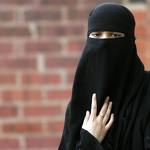Massachusetts college alters policy banning face coverings
From Cassie Spodak, Jamie Guzzardo and Yvonne Kalawur(CNN) — A Massachusetts college has modified a controversial security policy after criticism it infringed on the religious rights of students, a school official said Friday.
The policy originally banned any head covering that obscured the student’s face while engaged in student activities.
The Massachusetts College of Pharmacy and Health Sciences e-mailed students about the initial changes this week, saying, “Any head covering that obscures a student’s face may not be worn, either on campus or at clinical sites, except when required for medical reasons.”
School officials said the policy was intended to ensure that all students would be identifiable “for reasons of safety and security.”
But on Thursday, the policy was changed to include an exception “for medical and/or religious reasons.”
The original policy had prompted questions and concerns among Muslim students and organizations, particularly because it meant Muslim women at the college could no longer wear the niqab, or face veil.
The college — with campuses in Boston and Worcester, Massachusetts, as well as Manchester, New Hampshire — stated that the initial modification was “based on a constructive dialogue with our extended community, and an intensive review of safety and security measures with advisors.”
College spokesman Michael Ratty said, “We will achieve our objective of campus security while allowing for a medical and/or religious accommodation. As always, our primary concern is the security and safety of all our students, faculty and staff.”
Ratty stressed that Muslims were involved in the original policy decision saying, “Prior to implementation, the college discussed it with several officials within the Muslim community.”
Muslim students had mixed reactions to the original ban.
Aisha Bajwa, president of the Muslim Students Association at the college, called the unmodified policy “unjustified and unconstitutional.”
Bajwa, who does not wear the niqab, said that having to wear student IDs at all times keeps students safe.
Ibrahim Hooper, communications director for the Council on American-Islamic Relations, thinks the policy targeted Muslim students and filed a third-party complaint with the Equal Employment Opportunity Commission.
Writing to the commission, the Council invoked Title VII of the Civil Rights Act of 1964, which prohibits employers from discriminating based on religion.
Hooper acknowledged that the college’s policy focuses on students but said it will inevitably target Muslim employees in the future.
After the complaint, George Humphrey, the vice president for College Relations, e-mailed Hooper, announcing the new policy.
“We have reviewed our ID policy and made an accommodation for religious reasons,” the e-mail said. “Thank you for your input on this matter.”
Hooper then stated, “We are pleased that the religious rights of all students and staff will now be protected. This is a victory for religious freedom and tolerance.”
Ratty said, “The complaint was not the sole reason for the reversal but rather an ongoing discussion this week with our community.”Daniel Pipes, director of the Middle East Forum, supported the original policy.
Though Pipes acknowledged the larger cultural debate, he said the college is focusing on security.“I have documented dozens and dozens of cases about criminality and terrorism that have been abetted by burqas and niqabs,” he said. “It is sensible to ban these, and there are a number of these bans in institutions such as banks or jewelry stores.”
With increasing concern about terrorist attacks, religious practices will have
to be weighed against security, Pipes said.“In Turkey, the hijab has been banned from government offices, so this is not something that is just an American concern,” he added.
Well, that did not take long did it? Just two days ago, I posted the ‘Massachusetts College Bans Face Coverings, Muslims Outraged” story. Yesterday CAIR went into action and filed a complaint, and today the college has cowardly sided with Islam over their security concerns. Now anyone who wants to do something illegal there, can just hide under a burqa or Islamic face veil. Because there is no shot that the school will ask a person to remove it, to see who is underneath. Great move guys….



How come muz pukes are outraged about some stupid thing all the time….why doesn't anybody just tell them to STFU?
If France can ban these clown costumes so can the massholes. Man up, you dhimmi wimps.__
Strength is all that they respect. Now the get to move on to the next step in their goal of the Islamification of America.
Get together and rip off their veils and throw bacon on them. If enough many people do it they can't arrest everybody or kick everybody out of school.
Another idea of a peaceful protest is this. If I'm not mistaken there actually exists an official church of Star Wars. Convert to it and start going to school in Darth Vader and storm trooper suits. What can they say? I'm just practicing my religion…
Darth Vader costumes is a great idea.
And the college obviously cannot say that this concession is only for islam.
Maybe the college will realise how stupid they seem by first banning and then undoing the ban.
Hehe it would be absolutely hilarious if we will start to see Darth Vaders just about everywhere. Yes, and maybe that would also wake people up to how ridicolous dress codes the muslims have.
How can the school tell who is who in class if these peoples have their faces covered? Maybe it is time that these peoples respect the rights of others to have a safe environment to work and study in. I certainly would not sit next to some oddball with a rag over his or her face hiding their identity. I am glad i do not work at a bank because every time one these peoples came in the door i would sound the alarm.
No kidding! how do you know that it is that student taking the final or someone else???
So, how do we know who is taking tests? And if we don't, should we trust the degree of ANY woman from this school?
not all women hide under a veil!
That is a great point, but apparently Islam comes before all other concerns.
Where does the Koran tell women that they need to wear a burqa?
Reading this news first time, I was feeling good…….at last some college is showing the guts to tell the muslims where to get off.
But that show of strength was too good to last.
I guess it would take an obaya covered suicide bomber killing a number of Americans before this issue is revisted.
exactly!
And here I thought we had one last bastion of courage. I guess I was wrong.
CAIR probably casually mentioned…"lawsuit" and the college backed down. This is very discouraging news. I don't pity any of the female muslim students. They should have risen up and sided with the school administartion. They didn't. That in itself, tells me a lot.
But it also shows us who is making the decisions for the Islamic women…its the muslim MEN.
This is unacceptable. Muslims must adapt to our culture, which is an impossibility, so they should not be allowed to immigrate here and the ones who are here should be politely deported. NOW.
And frankly, these costumes offend me immensely. For one thing, they look just like the grim reaper, which is spooky enough, but it offends OUR sensibilities. My grandmothers fought long and hard not be considered chattal, to have the right to vote and own property and be considered human beings. Women all over the Muslim world are being denied even basic civil rights. And the world does nothing. What a piece of spineless school this is. This has got to be stopped. Hundreds of Christians and Jews being murdered all over their totalitarian and theocratic countries and in ours as well, but we bend over backward to not offend this dispicable religion? What is it going to take for Americans to say enough?
Amen!!!
When the first article was posted here…I posted a Call To Action on the ITF web site…I posted similar action request on Yuotube….
Now I'm not saying the CTA failed..or blaming those that did not respond to it. Only 3 came back to me and said they did send comments to the school….Nor am I criticizing and saying to those that didn't…grow some balls.
What I am saying is that as individuals, we can't do much…but as a team, we can do wonders. Most of us are sitting and reading all these posts and letting Chris and others do the heavy work. Its time we start working in tandem to get things done. This is a classic example of what happens when 99% of us do nothing.
Now…this is just a start for the Islamic train…next its another school..could be yours.
Then everyon needs to join Act for America.org or SIOA (Stop the Islamization of America)
You are right, we need more people to take the extra step and voice their opinions to our schools, government, law enforcement etc. It is a small effort that can go along way. Please pitch in guys!
Thanks.
WE MUST DESTROY THE CRIMINAL ACTIVITY OF ISLAM BEFORE THE CRIMINAL ACTIVITY OF ISLAM DESTROYS US. Down with honor killings, stoning women to death, lashing women, keeping women hidden behind Muslim rags, second class status for women.
Here is the contact info the the guy who wrote to CAIR.
http://www.mcphs.edu/directories/bio.aspx?ID=67
Hey, I see the Uniboob got the "Collaboration Award, Colleges of the Fenway (2006)"…maybe with Post Graduate Dhimmitude with Quisling Honours. Colonel Neville.
Is there anyone anywhere willing to stand up to islam?
Unfortunately, the upper echelon of CAIR is bullying the entire country.
Jesus H. Christ.
It may have a lot to do with the Muslim Student Association being a Muslim Brotherhood Hamass front since it started in 1963. Here's an absolute terrifying bombshell insight into INVITED! Islamic infiltration of ALL US law enforcement from the FBI down. From Bill Whittle at PJTV com. Colonel Neville.
pjtv.com/video/Bill_Whittle_Investigates/The_Islamic_Infiltration%3A_Inside_Our_Government%2C_Armed_With_Our_Secrets/2930/
It is pathetic how we let the Muslim Brotherhood operate in our own backyard. Russia as them designated as a terrorist organization and so should we.
The dhimmification of the USA began w/ OPEC – Jimmy Carter was thrilled to be part of the Islam team, even as a lowly kuffir. Now it's 40 years later & dhimmi behavior always trumps basic common sense. We even elected an anti-American president because he has a pretty smile! It's not just Iran that needs a full-blown revolution; Americans who appreciate Western civilization & achievments will have to forcibly take back our country, probably quite soon. Get prepared, people.
Obama won because because millions were mesmerized by his speech giving abilities.
yeah and Hitler gave good speeches too!
And he didn't need teleprompters either.
islam is a political movement hell bent on world domination. Islam means Submission and not peace which was coined by the muslim brother-hood of egypt.
http://www.faithfreedom.org
http://www.thereligionofpeace.com
http://www.thethirdjihad.com